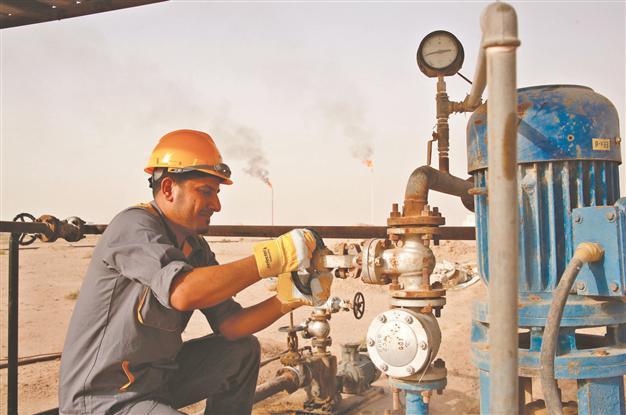Energy still an obstacle in Turkish-Iraqi normalization
BAGHDAD - Hürriyet Daily News

A worker adjusts the valve of an oil pipe at the Najaf oil refinery. The energy issue stands as one of the key hurdles in front of a full normalization in Turkish-Iraqi relations. REUTERS photo
Although Turkey and Iraq have agreed to push for a fresh start after nearly two-and-half years of coldness in ties and to begin technical talks for cooperation on trade, economy and transportation; the energy issue will likely stand as one of the most important hurdles before full normalization of bilateral relations.
Foreign Minister Ahmet Davutoğlu held two important meetings on Nov. 10, one with Iraqi Prime Minister Nouri al-Maliki and the other with Foreign Minister Hoshyar Zebari which produced some concrete results in the rapprochement process.
Firstly, the two countries have decided to reactivate the political dialogue mechanism at the level of foreign ministry undersecretaries but this time, with the participation of high-level officials from other key ministries. The first of this kind of enlarged mechanism will take place in Ankara on Dec. 6 and 7. This meeting is considered to be preparatory for the planned high-level strategic partnership meeting in Turkey which will be held in either late December or in early 2014 under the co-leadership of Prime Minister Recep Tayyip Erdoğan and al-Maliki.
In the meantime, the two countries’ ministers for transport, trade and economy are expected to conduct visits to each other’s country to discuss ways to deepen cooperation in these said fields. Establishing new railways between the two countries, opening new border gates and increasing $12 billion trade volume are among the common goals of the two countries.
Al-Maliki’s visit is expected to be a milestone in ties between the two countries after nearly two-and-half years of coldness. Erdoğan and Maliki harshly criticized each other during this period but it seems conditions necessitated both sides to take steps towards each other.
While al-Maliki is trying to enter pre-election campaign in a much more comfortable position after mending ties with Turkey, he is also having tough times at home due to growing terror waves that kill nearly 1,000 each month. Erdoğan on the other hand is trying to revisit his old alliance with Maliki in the face of his troubled foreign policy in the Middle East especially in the Syrian theater.
Whatever the reasons are for rapprochement, an improved relation between Turkey and Iraq is always necessary for a stable Middle East, according to many diplomats.
But there is a major stake before full normalized relations between the two countries. This is Turkey’s efforts to sign broad agreements with the Iraqi Kurdistan Regional Government (KRG) although the autonomous region’s government and central government could not yet agree on how they will share the revenues of the oil and natural gas resources.
Iraq is against third countries’ signing contracts with northern Iraq but for Ankara these agreements are not in violation of the Iraqi constitution. Ankara underlines that this was an issue between central and regional government and assures that it will abide by 83-17 percent deal between Baghdad and Arbil. Iraqi jurisdiction stipulates that oil revenues will be divided between the north and central government on percentages of 17 and 83.
Iraq continues to express its uneasiness with regard to Turkey’s unilateral deals with the north but it did not loudly express this criticism during Davutoğlu’s trip. Both sides will talk on the matter at both a technical and political level and will try to resolve the long-standing issue before al-Maliki’s upcoming trip.
